
DCU Unplugged

Pull the plug - and help us save energy
'DCU Unplugged' is a campus-wide initiative, led by DCU Estates team with DCU Sustainability.
The main aim of 'DCU Unplugged' is to drive down energy consumption across DCU, and increase awareness among students and staff about the steps each of them can take to help us achieve this.
The message is simple - we are reminding staff and students to take simple measures every day when in DCU, and at home.
We have teamed up with the Sustainable Energy Authority of Ireland (SEAI) in outlining energy saving tips below - these are simple everyday hacks which we can all start following straight away.
Help us save energy, and create a more sustainable campus

Switch stuff off - pull the plug!
- Heating - Turn the heating off when you leave the house or if you go away. Remember, your radiators will continue to heat your home for some time after the heating has been turned off.
- Appliances - Switch off all your appliances at night and when you are not home. You should turn off your computer whenever you are not going to use it for more than an hour.
- Devices - Use a power strip which means that at night or when you leave the house, you can easily unplug your devices at once.
- Lighting - Turn off lights when you are leaving a room or when you do not need them.
- Cooking - When your food is nearly cooked, turn off the rings/oven and use the built up heat to finish cooking your food.

Let the light in - maximise natural daylight in your accommodation/lecture room
- Windows - Maximise the use of daylight. Hold off switching on lights in the evening until absolutely necessary.
- Layout - Position your furniture so you make the most of natural light.
- Light bulbs - Replace failed light bulbs with energy efficient options, in particular LED lights. Select the lowest wattage bulb needed to light the room/area and consider the size of the space and how much natural light the space gets.
- Turn off the lights - Remember to turn off the lights when you are leaving a room or where you do not need them.
- Use sensors - Outdoor lights can be fitted with sensors and timers to reduce operating times.

Get the most of your existing appliances - use them better
- Washing machine and dishwasher: Most of the energy used by a dishwasher and washing machine is for water heating. By running these appliances at a lower temperature setting you will save on your energy costs. Make sure they're filled up before switching them on to avoid wasting water and energy. Try to use the washing machine and dishwasher at times when there is lower energy demand and avoid turning it on between 7-9 in the morning and 5-7 at night. This may not save you money but will help avoid excessive CO2 emissions from power stations.
- Tumble dryer: Tumble dryers are big energy guzzlers so dry clothes on a clothes horse or washing line on warm and dry days. When you do use a dryer, try to put heaving and light clothes into separate loads.
- Fridge / Freezer: Don’t leave the fridge door open for too long while getting food. For every 10–20 seconds the door is open it takes 45 minutes for the fridge to cool down to its original temperature. Don’t put warm or hot food straight into the fridge or freezer. The fridge or freezer has to work extra hard and draw more energy to cool it down. Thawing food in the fridge is better for keeping your food safe to eat and keeps the fridge cool. Defrost the inside of your freezer at least every six months to help it run efficiently.
- Boilers: Having your boiler serviced once a year will make it more reliable, safer and run more efficiently. When you are having your boiler serviced ask your plumber to explain the settings and how to use them correctly.

Cook clever and make the most of your oven, hob and kettle
- Oven: Keep your oven door shut and use the space well. Batch cooking saves you time and energy, especially if you have a busy lifestyle.
- Hob: Don’t let the heat escape by covering your pots and pans with a lid. The lid keeps the heat in and reduces condensation in the kitchen. Use the right sized hob for your pan - the closer the match, the less energy you use.
- Kettle: Don't boil full kettles for one cup of tea, but do make sure you have enough water to cover the element.
- Energy savers: Where possible use a microwave for cooking, and use the toaster rather than the grill.

Temperature
- Temperature: Turn the thermostat for your living areas down to 20°C. The temperature in hallways and bedrooms should be cooler, ideally between 15-18°C. You can reduce your heating bill by 10% by lowering your room temperature by just one degree.
- Radiators: Use the radiator valve to turn the temperature down or off in rooms that you do not use a lot.
- Hot water: Set your hot water thermostat to between 60-65°C, to make sure that you do not overheat your water.
- Appliances: Most of the energy used by a dishwasher and washing machine is for water heating. Run them on a lower temperature setting and save on your energy costs. Wash clothes at 30°C if they aren’t particularly dirty.
- Fridge freezer: Keep your fridge's temperature at between 2–3°C for the best performance. This keeps your food safe to eat and avoids freezing (and ruining) your fruit and veg. The freezer should be set to -15°C.

Heat it when you need it - use timers or smart heating controls to fit your routine
- Heating timers: Set the times that your heating comes on and off so that it fits with your daily routine. Radiators will continue to heat your home for some time after the heating is turned off. So try this, turn on your heating 30 minutes before you need it and turn it off 30 minutes before you don’t need it anymore.
- Smart heating controls: Many homeowners are investing in smarter heating controls. These are often offered by their energy supplier. They control both time and temperature and are easily programmable to your daily and weekly routines all from your smartphone. We even offer a grant of €700 to help you finance this upgrade. Visit our page on Heating Upgrade Grants for more information on how to apply.
- Hot water: An immersion timer can be really useful for ensuring you have hot water only when you need it. Then keep that hot water warm with insulation or a lagging jacket on the immersion. Set your water heating to 65 degrees celsius on your immersion heating so that you don’t waste energy by overheating water.

Tackle the cold draughts around your home. That way you will keep heat where you need it
- Listen to your mother: Close doors between rooms that are heated and unheated to keep the heat in.
- Plug draughts: Check windows, keyholes and doors for draughts of cold air and plug them. Unused fireplace? A chimney balloon will keep the draughts out and the heat in.
- Curtains: Close curtains to keep heat in, but open them in the morning to let the heat of the sun in.

Don't pour money and energy down the drain!
- Showers: A shower typically uses 20% of the energy compared to a full bath, so keep the bath as a treat.
- Taps: Don’t leave the hot tap running - you are pouring energy and money down the drain. See our Temperature tips for reducing your appliance and water heater temperatures.

Find out how much energy you are using in real time and base decisions on this information
Electricity monitors: These devices tell you how much energy you are using in real time. If you switch on the shower or the kettle, you can see the numbers jump. Monitors are great for getting a handle on where you use the most energy. You can make decisions on your energy use based on real data.

Switch stuff off - pull the plug!
- Heating: Turn the heating off when you leave the house or if you go away. Remember, your radiators will continue to heat your home for some time after the heating has been turned off.
- Appliances: Switch off all your appliances at night and when you are not home. You should turn off your computer whenever you are not going to use it for more than an hour.
- Devices: Use a power strip which means that at night or when you leave the house, you can easily unplug your devices at once.
- Lighting: Turn off lights when you are leaving a room or when you do not need them.
- Cooking: When your food is nearly cooked, turn off the rings/oven and use the built up heat to finish cooking your food.

